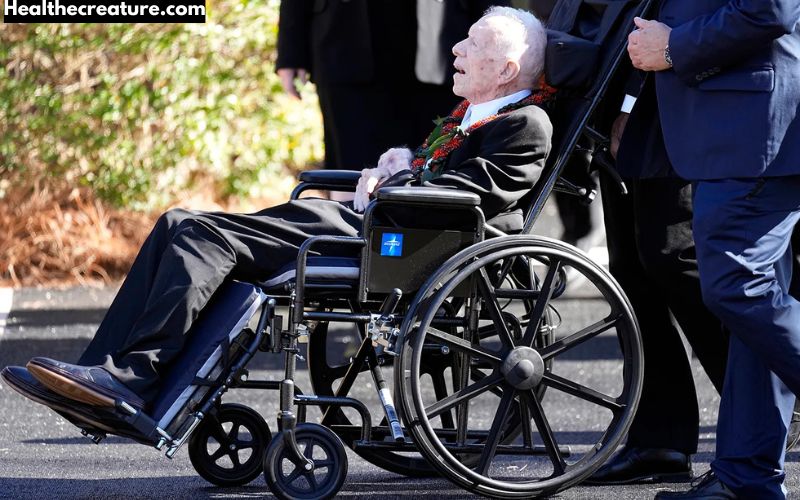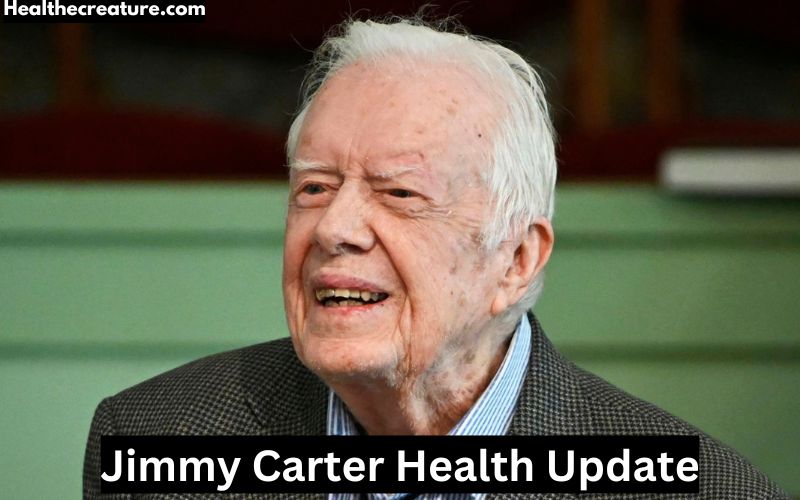Jimmy Carter, the 39th President of the United States, continues to inspire the world with his extraordinary journey of perseverance and resilience. From his early days as a peanut farmer in Plains, Georgia, to his years of humanitarian work post-presidency, Carter has consistently shown unmatched strength, even in the face of health challenges. Born on October 1, 1924, Carter recently reached the milestone of 100 years, a remarkable feat made possible by his enduring physical and mental resilience. Despite encountering serious health concerns in his later years, including a cancer diagnosis and several injuries, Carter has navigated his struggles with grace, relying on faith, family, and medical advancements.
As of December 2024, Carter remains in hospice care at his Plains, Georgia, home—a decision announced in February 2023. His longevity in this stage is extraordinary, exceeding the average hospice care period, sparking admiration and curiosity among medical professionals and supporters alike. This article delves into Carter’s health updates, the challenges he has overcome, and the contributing factors behind his incredible life span.
Early Life and Presidential Years
Jimmy Carter’s early life in Plains, Georgia, shaped his values of community service and hard work. Born into a modest family, Carter pursued a Naval career, graduating from the U.S. Naval Academy in 1946 and serving for several years before returning to manage his family’s peanut farm. His humble beginnings laid the foundation for his political aspirations. Carter’s political career took off in the Georgia State Senate and later as Governor of Georgia from 1971 to 1975. His pragmatic leadership and focus on civil rights elevated his profile on the national stage.
In 1976, Carter won the presidency, defeating incumbent Gerald Ford. His tenure as president (1977-1981) was marked by significant achievements, such as the Camp David Accords, a historic peace agreement between Egypt and Israel. Carter also prioritized energy independence and human rights. Despite facing challenges like the Iran hostage crisis and economic inflation, Carter left office with a legacy of diplomacy and integrity.
Carter’s Prolific Post-Presidency
After his presidency, Jimmy Carter began what is often hailed as the most impactful post-presidential career in history. He founded The Carter Center in 1982, a non-profit organization dedicated to global health, peace, and human rights. Under his guidance, the Center has made significant strides in eradicating diseases such as Guinea worm and promoting free elections worldwide. Carter also became an active volunteer with Habitat for Humanity, helping build homes for underprivileged families across the globe.
In 2002, Carter was awarded the Nobel Peace Prize for his humanitarian work and commitment to conflict resolution. His post-presidency years were marked by constant travel, hands-on involvement in projects, and advocacy for marginalized communities. Despite entering his 90s, Carter remained physically active, frequently participating in charity projects and teaching Sunday school in Plains. His efforts redefined what it means to be a former president, inspiring millions to dedicate their lives to service.

Health Challenges: Battling Cancer and Injuries
Jimmy Carter’s health challenges have been well-documented, showcasing his incredible ability to overcome adversity. In August 2015, at the age of 90, Carter revealed that he had been diagnosed with metastatic melanoma. The cancer had spread to his liver and brain, requiring immediate treatment. Carter underwent surgery to remove part of his liver, radiation therapy, and advanced immunotherapy with pembrolizumab—a drug that boosts the immune system’s ability to fight cancer. Miraculously, within a few months, Carter announced that his scans showed no signs of cancer, attributing his recovery to medical advancements, faith, and family support.
In subsequent years, Carter faced multiple falls and injuries. In 2019, he underwent hip surgery following a fall at his home. Later that year, he suffered additional falls that resulted in a pelvic fracture and a minor brain bleed, requiring surgery. Despite these setbacks, Carter remained determined, returning to public life, including teaching Sunday school just weeks after surgery.
Transition to Hospice Care
In February 2023, the Carter family announced that Jimmy Carter would receive hospice care at his home in Plains, Georgia. Hospice care is a form of end-of-life care focused on comfort, prioritizing quality of life over aggressive medical interventions. This decision allowed Carter to spend his remaining time with his beloved wife, Rosalynn Carter, and surrounded by family and friends. Carter’s choice to embrace hospice care sparked important conversations nationwide about dignity, autonomy, and patient-centered care during life’s final stages.
As of December 2024, Carter has surpassed expectations, living for nearly two years in hospice care, far exceeding the typical timeline for such patients. His prolonged survival is attributed to exceptional medical attention, family support, and his innate resilience. While Carter’s public appearances have diminished, he remains mentally engaged, cherishing quiet moments with loved ones. His experience highlights the value of hospice care as a compassionate alternative for those facing terminal illnesses.
Factors Behind Jimmy Carter’s Longevity
Jimmy Carter’s remarkable longevity, reaching the age of 100, can be attributed to several key factors. First, Carter has maintained an active lifestyle throughout his life, engaging in physical activities like carpentry and farming well into his 90s. Second, Carter has adhered to a healthy diet, often emphasizing fresh, homegrown foods and moderation in his habits. Avoiding smoking and excessive alcohol consumption has also contributed to his physical well-being.
Faith has played a central role in Carter’s life. His strong religious beliefs and weekly involvement in teaching Sunday school have provided him with a sense of purpose and mental peace. Additionally, Carter’s lifelong commitment to humanitarian work, coupled with a supportive family and community, has fostered a positive mindset. Access to quality healthcare, including cutting-edge cancer treatments, has further enabled Carter to overcome significant health challenges. His story exemplifies how a balanced lifestyle, mental resilience, and social support contribute to longevity.
Public Response and Legacy Amid Health Struggles
Jimmy Carter’s health journey has drawn widespread public attention, reflecting the immense respect and admiration he commands globally. When news of his cancer diagnosis emerged in 2015, there was an outpouring of support and prayers for his recovery. His candidness about his health struggles and decision to undergo hospice care has encouraged open discussions about aging, terminal illness, and quality of life.
Carter’s continued resilience has strengthened his legacy as a leader who faces challenges head-on, whether in public service or personal health. The public and media have praised his bravery, often pointing to his unshakable faith and optimism as sources of inspiration. Carter’s enduring influence, even amid health struggles, cements his place as one of the most beloved figures in American history.
Quick Facts
| Full Name | James Earl Carter Jr. |
| Date of Birth | October 1, 1924 |
| Place of Birth | Plains, Georgia, USA |
| Age | 100 years |
| Spouse | Rosalynn Carter (married 1946–2023) |
| Children | Jack, James III, Donnel, and Amy Carter |
| Presidency | 39th President of the United States (1977–1981) |
| Post-Presidency Work | Humanitarian efforts, The Carter Center, Habitat for Humanity |
| Major Health Challenges | Melanoma (2015), falls resulting in injuries (2019) |
| Current Health Status | In hospice care since February 2023 |
| Legacy | Nobel Peace Prize Winner, Global Humanitarian, Peacemaker |
FAQs
What is Jimmy Carter’s current health status?
As of December 2024, Jimmy Carter remains in hospice care at his home in Plains, Georgia. He has been receiving hospice care since February 2023, focusing on comfort and quality of life while surrounded by his family.
What major health challenges has Jimmy Carter faced?
Jimmy Carter has overcome significant health challenges, including metastatic melanoma diagnosed in 2015, which spread to his liver and brain. He also experienced multiple falls in 2019, resulting in hip surgery, a pelvic fracture, and a minor brain bleed, all of which he recovered from with remarkable resilience.
How has Jimmy Carter managed to live to 100 years old?
Carter’s longevity can be attributed to a healthy lifestyle, physical activity, strong faith, and a sense of purpose through his humanitarian work. Access to advanced medical care and unwavering support from his family have also played vital roles in his longevity.
What is Jimmy Carter’s legacy beyond his presidency?
Beyond his presidency, Jimmy Carter is celebrated for his humanitarian work through The Carter Center, his efforts with Habitat for Humanity, and his advocacy for global health, human rights, and peace. His post-presidential achievements earned him the Nobel Peace Prize in 2002.
See Also: Toby Keith Health Update
Conclusion
Jimmy Carter’s life stands as a testament to resilience, humility, and service. From overcoming cancer to enduring hospice care with grace, Carter exemplifies strength in every facet of life. At 100 years old, his legacy extends far beyond politics, touching lives through humanitarian efforts, faith, and inspiration. Carter’s health journey reminds us of the value of compassion, family, and purpose, leaving a lasting example for future generations.


